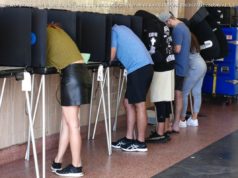Including cases that were investigated by Mueller.
Senate Majority Leader Mitch McConnell (R-Ky.) would like to close the book on the Russia investigation.
After all, he argued from the Senate floor on Tuesday morning, special counsel Robert S. Mueller III’s investigation has been complete for six weeks and the (redacted) report outlining his conclusions public for nearly two. With that information in hand, he wondered rhetorically, “would the country finally unify to confront the real challenges before us?»
“Would we finally be able to move on from partisan paralysis and breathless conspiracy theorizing,” he asked, “or would we remain consumed by unhinged partisanship and keep dividing ourselves to the point that [Russian President Vladimir] Putin and his agents need only stand on the sidelines and watch us as their job is actually done for them?»
“Regrettably,” he said, “the answer is pretty obvious.” So, with his speech, he hoped to “finally end this ‘Groundhog Day’ spectacle.” To that end, he offered a two-word summary, so potent in his view that his staff sent around a tease highlighting it beforehand.
“Two years of exhaustive investigation and nothing to establish the fanciful conspiracy theory that Democratic politicians and TV talking heads had treated like a foregone conclusion. They told everyone there had been a conspiracy between Russia and the Trump campaign,” McConnell said. “Yet on this central question, the special counsel’s finding is clear. Case closed.”
He repeated that phrase for emphasis: “Case closed.”
But that’s actually the less important part of McConnell’s phrasing. What’s more important is how he sets it up. The case that’s closed, he says, is this claim that Democrats and those talking heads had made about a “conspiracy between Russia and the Trump campaign.”
Let’s work backward from that. It’s true that the special counsel’s report states flatly that “the investigation did not establish that members of the Trump Campaign conspired or coordinated with the Russian government in its election interference activities.” That’s the sentence fragment which Attorney General William P. Barr included in his four-page summary of Mueller’s findings in March.
But it’s important to recognize what Mueller actually determined. It is not a blanket exoneration of Trump and his campaign as Trump likes to present it, but instead a failure to build a provable case. Two paragraphs later, the report makes this clear: “A statement that the investigation did not establish particular facts does not mean there was no evidence of those facts.”
What’s more, when considering the question of conspiracy, Mueller’s team applied a tightly bound standard for coordination, one which would “require an agreement — tacit or express — between the Trump Campaign and the Russian government on election interference.
Домой
United States
USA — Criminal The problem, Mitch McConnell, is specifically that not every case is closed





